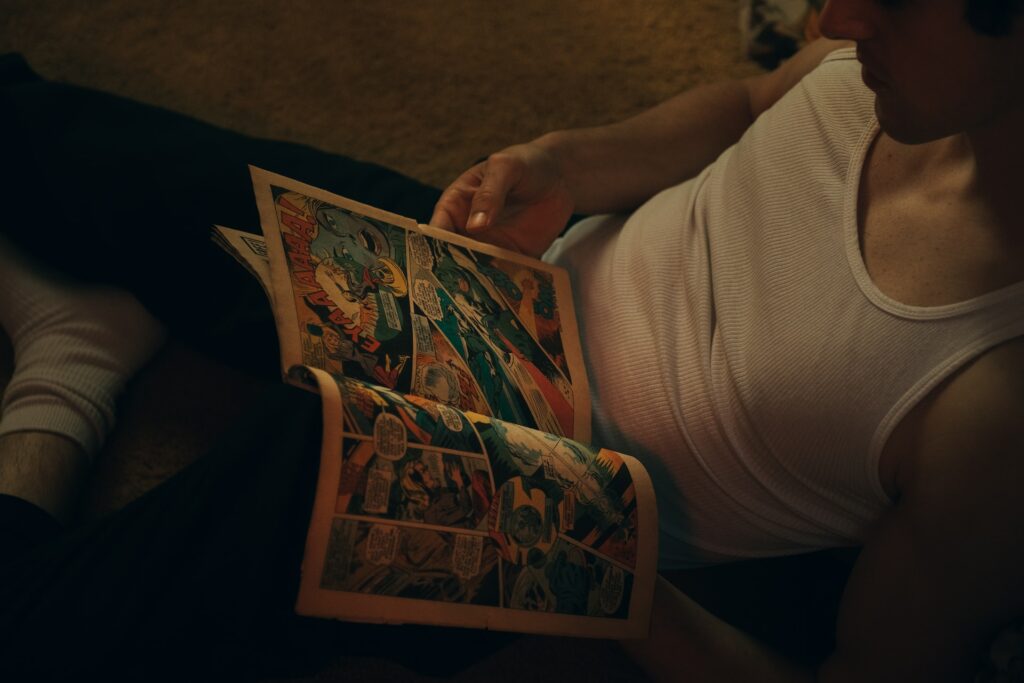Comic Books and Graphic Novels – What are the Legal Considerations?
Developing a comic book or graphic novel (we’ll collectively refer to as “comics” in this blog) is an exciting adventure to embark upon. While making comics may share similarities to writing prose, comics come with their own set of novel legal considerations (pun intended).
For one, the comic may be based on existing characters or stories. Another unique aspect is that it may be a joint venture involving several creators in the production of the comic. As well, publishing or distribution of comics can be unique due to their serialized form of storytelling. Each of these elements lead to legal considerations that will be discussed in this blog.

Join Our Community
Be the first to read new articles, industry news, and more. Sign up to our newsletter today!
The Origin Story: What Intellectual Property is the Comic Based On?
The comics industry has a habit of reusing characters and concepts. Characters like Batman and Spider-Man have continuously starred in their own comics for close to a century. However, any individual cannot simply publish a new comic starring Batman or Spider-Man. This is due to intellectual property rights being exclusively held by certain entities.
The exclusive rights to Batman and Spider-Man (and their storylines, villains, and other supporting characters, imagined settings, etc.) are owned by DC Comics and Marvel Comics, respectively. This is why it is important to assess what your comic is about early on. If you produce a comic that uses established characters – such as ones published by DC, Marvel, or Image – then your publication will likely constitute copyright infringement.
The best way to legally use these established characters is obtaining permission from the copyright owner. Practically, it would be extremely difficult to get permission to use some of the most famous comic characters the world has ever known. Easier, though not necessarily guaranteed, is to get the right to create a comic based on a lesser-known character. There are no legal risks to producing your comic if it is an original work – based on original characters and concepts that you have developed.
Collaboration Agreements: Legal Considerations for Working with other Creators
Working and collaborating with other creators – writers, artists, inkers, letterers – can be an exciting and fun process. However, there are important legal questions to consider, and to discuss with your creative partner(s).
While these may seem unnecessary early on, if your comic ends up being successful and profitable, then the following questions are particularly important. This is why it is recommended to discuss these items early and, if possible, to incorporate them into a writing or collaboration agreement. (We can help with that.)
Copyright Ownership
If the comic is original, who will own the copyright to the comic, its characters, and its stories?
Decision-Making
How are business and creative decisions made among the creators? Is it a majority vote? What happens if there is a tie? Does one person have a veto?
Deliverables
Are there deliverables that one creative owes to the other(s)? If so, what is the scope and what are the timelines? Are there required formats for the deliverables (such as, electronic pdfs)? Do the deliverables require approval from the other(s)?
Credit
How are the credits apportioned between the creatives?
Future Stories
Who, if anyone, has the power to create future stories, such as sequels, prequels, or spinoffs, based on the original comic? Can either the writer or artist develop these future stories? Does either need the consent of the other?
Creator Leaves
What happens if one creative leaves prior to the comic being finished or published? Do they retain any ownership? Do they receive any compensation? Can the remaining creative(s) continue developing the comic?
Compensation
How are all the creatives being compensated? Is there a fixed fee for performing services? Who is paying whom? Is there back-end contingent compensation – i.e., royalties from gross sales or profit from sales after publication? What if the comic is adapted to film or other creators create a new comic based on the original that you published?
Publishing Agreements: What to Know When Publishing Comics
While not all comics are produced in serialized single-issue formats, publishing and distribution in comics can often be unique when compared to other forms of written publications. Publishing agreements may require deliverables from the creators at various stages to correlate with the stages of comic production (being script, pencils, inks, colours, and letters).
Each of these stages may also have particulars for the format of delivery of the work. Where the publication is single-issue serialization, these delivery requirements may be on an ongoing basis, such as, every month.
One of the most important clauses in any creative agreement is the grant of rights. For publishing and distribution agreements relating to comics, it is important to understand the scope of the rights being granted by the creator to the publisher and distributor.
The related questions include:
- Are the rights to a full comic series (and each individual issue)?
- Do the rights include the rights to create and distribute derivative works such as sequels, prequels and spin-offs?
- What formats are covered – print only, or print and digital?
- Are the rights granted for the whole world or some specific territories (locations)?
Conclusion: Legal Considerations for Comic Books and Graphic Novels
Creating comics can be a rewarding endeavor, especially when you work with other talented creatives. However, comics have unique characteristics that lead to particular legal considerations. To plan for success and to reduce the likelihood of challenging issues in the future, make sure you understand copyright and contractual considerations as they apply to the creation and distribution of comics.
For any questions you may have relating to comic book law and intellectual property matters, please get in touch with us. We would love to help as you create your story.
© 2023 Edwards Creative Law, LLP – Updated to October 6, 2023
Edwards Creative Law is Canada’s Entertainment Law Boutique™, providing legal services to Canadians, and international clients who partner with Canadians, in the Film & Television, Music, Video Games and Apps, Publishing and Literary industries.
For more information or to set up a minute Discovery Call with one of our entertainment lawyers please feel free to Contact Us.
* This blog is for general informational purposes only and is not to be construed as legal advice. Please contact Edwards Creative Law or another lawyer, if you wish to apply these concepts to your specific circumstances.
Check out our popular blog posts:
Neighbouring Rights in Canada – Being a Musician is a Business
Setting up a Music Publishing Company in Canada
Copyright Protection & Classical Music
Work Made for Hire Explained
10 Co-Production Considerations in Canada – Ask an Entertainment Lawyer
Film Profits & Points – Ask an Entertainment Lawyer
The “Just Trust Me” Legal Agreement
Learn more about our services:
Film and Television Law
Music Law
Video Game and App Law
Publishing and Literary Law
Employment Law
Dispute Resolution and Litigation Law
Corporate Law
International Services






